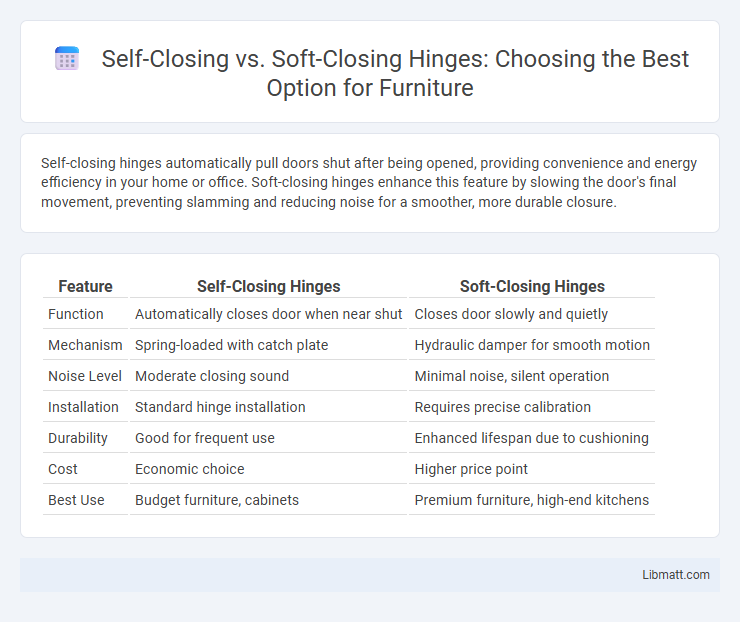Self-closing hinges automatically pull doors shut after being opened, providing convenience and energy efficiency in your home or office. Soft-closing hinges enhance this feature by slowing the door's final movement, preventing slamming and reducing noise for a smoother, more durable closure.
Table of Comparison
| Feature | Self-Closing Hinges | Soft-Closing Hinges |
|---|---|---|
| Function | Automatically closes door when near shut | Closes door slowly and quietly |
| Mechanism | Spring-loaded with catch plate | Hydraulic damper for smooth motion |
| Noise Level | Moderate closing sound | Minimal noise, silent operation |
| Installation | Standard hinge installation | Requires precise calibration |
| Durability | Good for frequent use | Enhanced lifespan due to cushioning |
| Cost | Economic choice | Higher price point |
| Best Use | Budget furniture, cabinets | Premium furniture, high-end kitchens |
Introduction to Cabinet Hinges
Cabinet hinges play a crucial role in the functionality and durability of your furniture, with self-closing and soft-closing hinges being two popular options. Self-closing hinges automatically pull cabinet doors shut using spring tension, ensuring they don't remain ajar. Soft-closing hinges, on the other hand, use hydraulic mechanisms to slow the door's motion for a gentle, noiseless closure, enhancing both convenience and longevity.
What Are Self-Closing Hinges?
Self-closing hinges are mechanical devices designed to automatically close doors or cabinets after they have been opened, using spring tension or hydraulic mechanisms. These hinges improve safety and energy efficiency by preventing doors from being accidentally left open, reducing drafts and noise. Your choice of self-closing hinges can enhance convenience in high-traffic areas or kitchens where hands-free operation is beneficial.
Understanding Soft-Closing Hinges
Soft-closing hinges use a hydraulic or pneumatic mechanism to gently slow the door's movement, preventing it from slamming shut and reducing noise. These hinges enhance cabinet longevity by minimizing wear and tear on both the door and frame. Ideal for kitchens and bathrooms, soft-closing hinges improve user experience through smooth, controlled door closure.
Key Differences: Self-Closing vs Soft-Closing Hinges
Self-closing hinges automatically close doors after being opened using a spring mechanism, ensuring the door returns to a closed position without manual effort. Soft-closing hinges feature a dampening system that slows the door's closing speed, preventing slamming and reducing noise. The key difference lies in self-closing hinges providing automatic closure, while soft-closing hinges control and cushion the closing motion for enhanced door protection.
Advantages of Self-Closing Hinges
Self-closing hinges provide reliable door closure by automatically pulling the door shut, enhancing energy efficiency and security in your space. These hinges are durable, require minimal maintenance, and prevent doors from being accidentally left open, reducing noise and drafts. Ideal for commercial and residential use, self-closing hinges improve convenience and maintain controlled environments.
Benefits of Soft-Closing Hinges
Soft-closing hinges provide a smooth and quiet closing action that reduces noise and prevents door slamming, enhancing overall comfort and durability. These hinges minimize wear and tear on cabinets by absorbing the impact, extending the lifespan of both the door and hinge mechanism. Their gradual closing feature also increases safety by reducing the risk of finger injuries, making them ideal for homes with children.
Installation Process: Self-Closing vs Soft-Closing Hinges
Self-closing hinges typically require basic installation steps involving standard screws and alignment with the door frame, making the process straightforward and faster for most DIY projects. Soft-closing hinges demand more precise fitting, often involving adjustable tension screws and additional calibration to ensure smooth and silent closing action, which may require specialized tools or professional installation. Both hinge types necessitate accurate positioning, but soft-closing hinges generally take longer and need fine-tuning for optimal performance.
Durability and Maintenance Comparison
Self-closing hinges are generally more durable due to their simple mechanical design and fewer components, requiring less frequent maintenance and reducing the chances of malfunction over time. Soft-closing hinges incorporate additional dampening mechanisms that provide gentle closing action but may need more regular maintenance to ensure consistent performance and avoid wear on the hydraulic or piston systems. If you prioritize durability with minimal upkeep, self-closing hinges offer a longer-lasting solution, whereas soft-closing hinges provide enhanced functionality at the expense of increased maintenance.
Choosing the Best Hinge for Your Needs
Selecting the best hinge depends on the desired functionality and application. Self-closing hinges ensure doors or cabinets close automatically, enhancing convenience and security in high-traffic areas. Soft-closing hinges provide a gentle, noise-free closure, ideal for preventing damage to furniture and offering a premium user experience in residential or office settings.
Final Verdict: Which Hinge Should You Choose?
Soft-closing hinges offer a smoother, quieter closing experience ideal for high-end cabinets and preventing door slamming, while self-closing hinges are more affordable and effectively ensure doors stay shut without extra hardware. Choose soft-closing hinges for premium durability and noise reduction in kitchens or bathrooms with frequent use, whereas self-closing hinges suit budget-friendly projects requiring reliable automatic door closure. Ultimately, the decision depends on balancing cost, desired functionality, and application environment.
Self-Closing vs Soft-Closing Hinges Infographic

 libmatt.com
libmatt.com